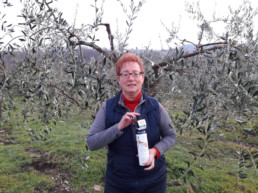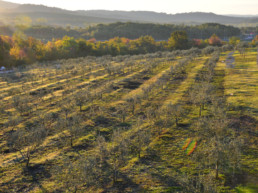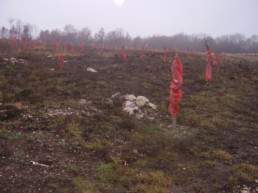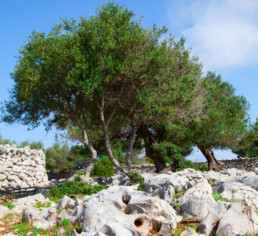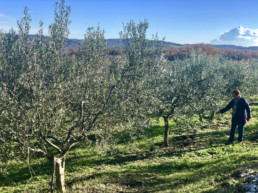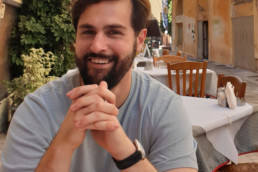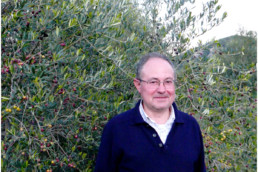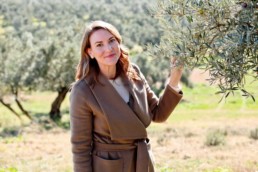INTERVIEW
Mili Kus: “My main teachers were trial and error”
By Maria Lovchina | Photo credit: Mili Kus | 21.03.2020
Mili Kus – producer of internationally recognized, award-winning Oliva Lucia extra virgin olive oil. In today’s interview, we were honored to speak with this outstanding woman about career reinvention, the flipside of success and the intelligence of the olive tree. Mili shares her tips on how to choose first quality olive oil and opens up about retirement, having passed the management of her grove to a family-owned company, Ipša d.o.o.
Mili Kus was born and grew up in Canada. She worked in a stockbroking company in Toronto. Having tragically lost her husband just a few months after marriage, she decided to move to Slovenia, her parents’ home country, in 1992. There she continued working in the field of investment management. During holidays in Croatia she met Slavko Antunac, whom she would marry a year later. Together, they decided to plant an olive grove in northern Istria, in Croatia, and become olive oil producers. Soon afterwards, they launched the Oliva Lucia brand. The farm received organic certification in 2014. Oliva Lucia extra virgin olive oil won gold, silver and bronze medals at national level, and then the silver medal at the New York International Olive Oil Competition (NYIOOC) in 2017. This was followed by the Gold medal at NYIOOC in 2018.
— Was your husband inspired by the idea of producing olive oil? Did he believe in the project?
— He believed in the idea. Perhaps, he didn’t believe in the size of the project. The idea was that he and I would create something jointly. He had two teenage children from his first marriage, I had none. In order to have a marriage that functions, you have to have something that is in common for the two of you. Working on the olive grove, was something that we did jointly.
— In a letter published on your website you say: “Like wine, producing a high-quality olive oil involves expertise which needs knowledge and perfection”. Can you please expand on that.
— Once you plant your olive trees, nothing can change the geographic location of the olive grove. Then it becomes a case of building up your knowledge of the micro climates in and around the grove and using them to your advantage in order to produce a high quality olive oil. Where and how the winds blow, where is the most sunlight, where is the best drainage, where is the best yield, where is the best oil produced? The answers to these questions are a product of time spent in the grove.
The knowledge comes from what you do in order that a tree thrives and bears fruit. Farming practices, tilling the soil, how the trees are pruned, watering… I wouldn’t advocate watering an olive tree unless it is young and you want it to take root. It has been scientifically documented that an olive tree will give you a better quality oil if it is not irrigated. You allow it to fight for its existence — then the tree will through its fruit also give you a much better quality.
The skill is also in watching for problems to come, taking preventive measures. We can have fruit flies, for example. If it bores a hole into the skin, the olive meat begins to oxidize and that begins to reduce the quality of the oil.
Timing of the harvest – that’s a big challenge. My olives tend to ripen very early, so that I have to start consulting with the olive mill in the middle of September. It is not that I am in a race to be the first one to the olive mill, but experience has now taught me, that I have to schedule the date of the start of harvest early.
There has to be close observation throughout the whole month of September. The ripening of the olives depends a lot on the amount of the sunshine, on the heat of the day, on the daily average temperatures and rainfall. If you have a severe drought, as we had in 2017, that delays the ripening of the olives a little bit. So that is where the knowledge part comes in.
Once you pick your olives, you have to then assess them. You have your oil in a stainless-steel vat. You are waiting for it to settle and then try to pick a time when you feel would be best to bottle it. You make sure that the residue that has stayed in the oil has settled. Because I am an organic farmer, I still leave a little bit of residue in the oil. Then the oil has to be kept under optimal conditions, that is somewhere between 15°C and 17°C.
Those are those critical points. You can work as hard as you like all year around but I think it’s those last stages – those six weeks of the harvest, then storage, and bottling – which are crucial. Once the oil is in the bottle there is really nothing more you can do, except keep the temperature stable and make sure your storage area is dark.
— Who were your most important teachers? People, books, events? What was the most important source that helped you acquire that knowledge?
— My main teachers were trial and error. Some of my knowledge has come from literature; some is intuitive. However, the most profound knowhow comes from experience. I learned some things from my husband. I learned some things from my employee. And then you talk with other producers, and somebody makes a comment. As an ecological producer, we also have seminars from the Ministry of Agriculture here. At least once a year I am somewhere in some kind of a formal setting where I am learning something. Here in Istria especially, we are in a world that is quite olive oil dominated. Every person will have some experience or contact with olive trees.
— Does the terroir influence the taste of the oil?
— The taste of an extra virgin olive oil is very much the sum of its terroir, hours of sunlight, pruning and harvesting methods, and warehousing of the final product. Most factors come from nature while the rest are the human interaction with the olive oil.
I have dark soil, black to dark brown, which wants to retain water. Anything that is put in, like pulverized rock, causes it to be a little bit lighter than what it was originally. Other parts of Istria have red earth, full of oxides. That’s why they say “terra rosa”. I don’t have red colored soil. I have dark colored soil.
I know how much time and effort we expended in preparing the soil for planting and how that effort has continued with cultivating the soil with organic fertilizers. Annual soil analyses confirm the suitability of these farming practices.
In each grove, you have to deal with the conditions that are presented to you. Once you plant the trees you basically plant them for at least 20-30 years, possibly even more. You have to build up your knowledge for that specific piece of land. I have slightly perching hills, that come down to a lower section. Everything has a little bit of gradient. There is nothing really flat. I don’t think I could live with an olive grove which is just flat. That would not be interesting.
«I look at the olive tree and I say: “What are you trying to teach me? What are you trying to tell me?” If an olive tree lives hundreds of years, her intelligence (it’s a she for sure) is vast. She is able to live under so many different climatic conditions – rain, sunshine, draught, rocks, good soil, poor soil. It’s amazing!»
— Preparing soil for an olive grove and clearing land of rocks was a huge job. Didn’t that part of the project scare you off or cause you to doubt when you were starting?
— No. That was a huge challenge. When we started off, my father was still alive; he passed away in 2010. He had a lot of building experience. So if I ran into a problem, I would just call him in Canada and he would give me advice and I would follow it. And that was it. It was just a case of rock moving, or pulverizing, or digging. You have backhoes, you have bulldozers, hydraulic breakers. It was about finding the right people who could do the right job. It was more of an engineering and coordinating feat than one involving farming practice.
— Did it take long to get the first real crop?
— We started in late 2005. I think we began picking something in 2009. The first couple of years we had very small harvests — just enough that you saw that the trees were beginning to bear fruit.
I have to admit, that at that time I just wanted to produce olive oil. I wasn’t even thinking of competitions or anything like that. It wasn’t until a couple of years later, that my customers kept telling me that my oil tasted good. You know, with that bizarre emphasis on «GOOD». This feedback, I guess, caused me to think a little bit more seriously. At the same time, Istria was also becoming more recognized as a preeminent olive growing region. That gave me the courage.
One of my colleagues encouraged me to enter my oil in a competition in Krasica, in order to see how it would rank. When you see the analysis, when you see how the tasters describe your oil, then you can go back and you review what you did, in order to achieve that. Probably the first mistakes I made were on the storage side. I didn’t know how to make a first quality olive oil immediately. Through time and experience I have learned that there are certain things that have to be so strict that you do not even think about deviating from how you work.
— What were your feelings when you learned that Oliva Lucia won Gold at the NYIOOC World Olive Oil Competition in 2018?
— I was in New York. I was there. It was such an elation! It was incredible! I was on cloud nine after. I came to the reception. There was a cocktail bar before hand, where you could taste various other oils. My oil was not on the tables for tasting. I thought that it had been so bad that it had not been even presented for tasting. And then I deduced that I was the only person from Croatia who was physically there. When Curtis Cord [president of the NYIOOC] started saying “The winner is from Croatia” – I thought there must be someone else here from Croatia. Then he goes “a Gold” – I thought “Somebody must have made a very good oil”. And then he said “Oliva Lucia”. I think I was just stuck there to my seat. I didn’t dash up to the stage, but I couldn’t wipe the smile off my face.
«A good olive oil producer will try to capture the best that an olive tree has to offer — capture it in a bottle, so that someone can consume it, so that it enhances your food and even adds to your health»
— What does it take to become an award-winning olive oil producer? What does it take to get there?
— A lot of work. You can figure that it takes from 8 to 10 kilos of olives to produce 1 liter of oil. I think that’s pretty fair, at least here in Croatia.
We’ll have a little bit of time off here in winter. But if you have oil you have to work on your marketing and sales strategies as well.
Pruning can start in February and continue until March-April easily, sometimes even into May, depending on weather conditions. You have to monitor for olive leaf spot. Then you also have to fertilize and cultivate the grove. Here in Istria, you are fighting with grass all the time. You have to cut grass in the grove otherwise it will grow so abundant, tall and thick that it will suffocate the growth of the trees. And then in the summer months you are monitoring the fruit fly situation. And then you are already into September. You are beginning to wash and disinfect all your equipment again, review what you have, whether you have to add anything. As I said in my case I have to begin contacting the olive oil mill from the middle of September. And then basically contact them every week, so that we have to gauge from the sample of the olives maturing, when they are ripe enough to be picked.
There is a lot of physical work. A lot of the olives in some way are still either handpicked or with the help of a shaker.
Olive trees keep you humble. You will never get to the bottom of their wisdom. That’s the whole charm and challenge of it. A good olive oil producer will try to capture the best that an olive tree has to offer — capture it in a bottle, so that someone can consume it, so that it enhances your food and even adds to your health.
Photo credit: Annete
— Why did you choose organic farming? What does it mean to be respectful towards the olive and towards nature?
— Nature is a basic good, it’s a basic right. It also came from my experiences with the olive tree.
In Dalmatia, if you travel there you will see that there are olive trees that are almost growing out of rock. They will be enclosed by rock walls. Talking to people you will see that those rock walls were formed because people over generations would pick up rocks and stones from that plot of land where you have that olive tree and build that wall. It just didn’t equate that I could think of anything else except organic farming. If olive trees could survive in those kind of conditions in Dalmatia, than here, where there is soil, you just have to let the tree live and thrive.
When the saplings come, they have a thin bamboo-type support to keep them upright. A plastic clip serves to keep the tree and the support together. On one sapling you could have a minimum of six – ten of these plastic clips. Even when we started it was never the case that those plastic clips were in the grove. It was in 2006, long before anybody was talking about the inundation of plastics in the seas, that I just did not want to have that plastic in the grove, because it didn’t degrade, didn’t decompose. We don’t have other garbage. We have rocks, we have soil, we have grass – we have natural things in the grove.
— Do you think that individual efforts, whether it is a single household or a business, matter given the global ecological situation?
— Absolutely. I think that everybody has to be concerned with what they do. You sweep your own doorstep. Just watch what you do.
— You career path is absolutely outstanding! Do you think your former experience in finance helped you build your own successful business in the olive industry? It seems like everything was so well-planned at every stage, including the recent deal with Ipša d.o.o. Would it have been likely without your solid background in finance?
— Nothing was planned in advance [laughs]. I have to admit. I think it was just a case of taking certain decisions at various crossroads in my life. Fortunately, I learned about 30 years ago that you really have to follow what you believe in. If you do that, and if you work diligently, then you will be successful. It is not necessary that you have a lot of knowledge at the outset, but if you are willing to learn, you will acquire it.
I look at the olive tree and I say: “What are you trying to teach me? What are you trying to tell me?” If an olive tree lives hundreds of years, her intelligence (it’s a she for sure) is vast. She is able to live under so many different climatic conditions – rain, sunshine, draught, rocks, good soil, poor soil. It’s amazing! The biggest common element that the olive growing regions in the world have is probably the temperature. But there are a lot of places in the world where you have olive trees now.
I am proud to say that the management of the grove has been taken over by Ipša d.o.o. It’s a family-run business. I have been dealing with the son, Ivan. He is about 30 years old. I am very pleased that he has taken up the tradition together with his parents. Unfortunately, my personal circumstances didn’t allow me to have my own family in that way.
On the other hand, I’ve often been tired; I’ve done a lot of physical work. But for whatever reason the olive tree never disappoints you. I don’t know why. If you walk through the grove, you look over the trees, and how they’ve grown over time, especially over the past 5- 6 years, how they are really beginning to spread their branches, it gives you a tremendous amount of satisfaction.
«Fortunately, I learned about 30 years ago that you really have to follow what you believe in. If you do that, and if you work diligently, then you will be successful»
— Is there something you dislike about working in the olive oil industry?
— Probably, what bothers me the most today is that a lot of people say that they have organic olive oil. It takes a lot of extra effort to get a certificate that you have ecological farming practices. I find it very misleading for somebody to say “oh, I have organic olive oil”, when that might not necessarily be true, because they have not gone through the same rigorous process of recording what they do, having it supervised, or having it reviewed by a supervising agency. You have to prove that you can put that label -“organic olive oil” – on your bottle.
— What is that you love the most about olive oil business?
— There is nothing in the world so sensual as the feeling of olives as they slip through your hands.
In the early years when the trees were all small, we did only hand picking. I would typically pick them without gloves. It’s the smell and the flavor of the olives passing through your hands. Then the palms of your hands become soft because they become a little bit oily. Everything around you smells green, bright green.
And then when you go to an olive mill, and olives have been pressed, there is a very specific aroma of green olive oil pervading the whole atmosphere at the mill. You can’t duplicate that.
— Could you give our readers a piece of advice on how to choose good quality extra virgin olive oil? What are the markers of good quality?
— First of all, if you want it to be a good olive oil, it has to be in a glass bottle. Do not consider anything that is in a plastic bottle. Metal is fine, too. If you can come across individual producers, read what they say on their labels.
Once you open a bottle, you can taste it. If you have a small kind of bulb-type glass, you cover the glass first for about a minute and swirl the oil around so that the aromas accumulate in that small space. Then you sniff it. And then you take a sip of it onto your tongue. Then you suck air through and breathe out through your nose so that you can really begin to taste the flavors of the olive oil.
The taste will go through three phases, which are also the levels under which the sommelier will assess them: that is the fruitiness of it, the bitterness and then the pungency. The bitterness and the pungency are typically indicators of the amount of polyphenols that are in the olive oil and consequently how green the olives were when they were picked. Certain varieties can have a higher pungency or bitterness. An olive oil is actually best when it is greenest. It is the opposite of wine. You do not allow olive oil to mature in the bottle. You basically want to use it. The practice here in the European Union is that the best “use by-date” for an extra virgin olive oil is a year and a half from the time of bottling.
